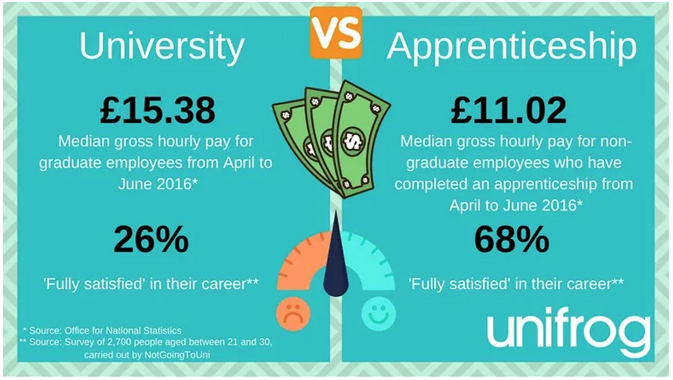 Abraham Lincoln
If given the truth, the people can be depended upon to meet any national crisis...
Abraham Lincoln
If given the truth, the people can be depended upon to meet any national crisis...
 Guildford news...
for Guildford people, brought to you by Guildford reporters - Guildford's own news service
Guildford news...
for Guildford people, brought to you by Guildford reporters - Guildford's own news service
Most Businesses Say a University Degree is Unimportant
Published on: 3 Aug, 2021
Updated on: 8 Aug, 2021
By Alexander Cardozo
work experience reporter
Who cares if you have a degree?
According to a YouGov report, 56% of businesses say that a job candidate’s degree is generally not important when recruiting.
Could this be part of the reason that 55% of students are considering dropping out of their courses according to ONS?

Graphic from Unifrog an organisation and website set up to help students make the right choices.
The figures come in the wake of a political shift surrounding university enrolment and question the value of a modern university degree.
 Famously, Tony Blair, in the 1990s, set a target of getting 50% of young people into university, however that target was scrapped last year, with Gavin Williamson, the education secretary, describing the policy as an “absurd mantra”.
Famously, Tony Blair, in the 1990s, set a target of getting 50% of young people into university, however that target was scrapped last year, with Gavin Williamson, the education secretary, describing the policy as an “absurd mantra”.
Former MP Anne Milton, trustee of University of Surrey Students’ Union, said she too disagreed with setting an “absolute figure” for university enrolment and believed that government policy should instead ensure that students went to the “correct institution”.
And Zoe Franklin, Guildford Liberal Democrat spokesperson on parliamentary matters, similarly said that government policy should be more nuanced and that school leavers should be enabled to “select the approach that best fits with their personal and financial circumstances”.
The YouGov data appears to support this policy shift, revealing that a majority of businesses are indifferent when it comes to a job candidate’s degree; just 14% of businesses say that a degree is very important and 56% say that it is generally unimportant.
Amanda Masters, CEO of Experience Guildford which supports Guildford’s retail sector, said that her members “value experience, graduate or not” and that stores “will engage quite happily for both programmes where there is a need”.
But, YouGov data does highlight that larger businesses are more likely to consider a degree valuable when hiring a new employee, with 56% saying that it is important, compared to just one in five of small businesses.
The Legal sector was revealed to place the greatest importance on degrees during the hiring process, with IT and Telecoms coming in second.
 Despite this, Debbie Hayler, of Surrey Satellite Technology Ltd, was keen to highlight that their high-tech company supported both paths by providing programmes for college leavers and university graduates.
Despite this, Debbie Hayler, of Surrey Satellite Technology Ltd, was keen to highlight that their high-tech company supported both paths by providing programmes for college leavers and university graduates.
From the perspective of students, the value of a modern degree is difficult to weigh up. Not only do fewer businesses consider a degree to be important when considering job candidates, but the effects of the pandemic have made it harder for students to study, decreasing the overall quality of the university experience.
 At the University of Surrey, face-to-face teaching has been widely disrupted with very few in-person events able to take place. The lack of normal university life has also contributed to declining student mental health with a recent ONS survey revealing that 63% of students said their mental health had worsened since the start of the academic year, in September 2020.
At the University of Surrey, face-to-face teaching has been widely disrupted with very few in-person events able to take place. The lack of normal university life has also contributed to declining student mental health with a recent ONS survey revealing that 63% of students said their mental health had worsened since the start of the academic year, in September 2020.
The lack of face-to-face teaching for large parts of this year has also rekindled the ongoing issues surrounding tuition fees with many claiming that the already high cost of university is unjustifiable under online learning.
Sue Hackman, campaign manager for the Guildford Labour Party, said that current fees are high for the “passive encounter” with lecturers that students have had over the past year and that “education needs what business got: financial support to maintain jobs and to offer the highest possible service and agree reparation for impaired tuition”.
These factors, poor mental health and rising costs, have meant that over the past year more than half of UK students have considered dropping out of university.
Nonetheless, UCAS has reported a surge in university applicants with 10% more applications for this Autumn, rising from 281,000 last year to a record 311,000 this year.
Matthew, a local 6th form student at Broadwater school in Farncombe, said that he has decided that for him university is the right choice. He believed his “skills are much more suited to an academic environment” and that a degree would make him more employable, especially in the long term. University would “offer the ability to develop a wide array of different skills” that an apprenticeship might not.
But he was concerned about declining mental health levels among students and did believe “that the value of more vocational options like apprenticeships is increasing”.
Responses to Most Businesses Say a University Degree is Unimportant
Leave a Comment Cancel replyPlease see our comments policy. All comments are moderated and may take time to appear.
Recent Articles
- Guildford Institute’s Crowdfunding Project for Accessible Toilet in its New Community and Wellbeing Centre
- Letter: Guildford – Another Opportunity Missed?
- Letter: GBC’s Corporate Strategy – Where Is the Ambition?
- My Memories of John Mayall at a Ground-breaking Gig in Guildford Nearly Six Decades Ago
- Westborough HMO Plans ‘Losing the Heart of the Street’ Says Resident
- College Invests to Boost Surrey’s Economy and Close Digital Skills Gap
- Community Lottery Brings Big Wins for Local Charities
- GBC Housing Plan Promises ‘A Vibrant Urban Neighbourhood’ Near Town Centre
- Hospital Pillows ‘Shortage’ at the Royal Surrey
- Updated: Caravans Set Up Camp at Ash Manor School


Recent Comments
- Ian Macpherson on Updated: Main Guildford to Godalming Road Closed Until August 1
- Sara Tokunaga on GBC Housing Plan Promises ‘A Vibrant Urban Neighbourhood’ Near Town Centre
- Michael Courtnage on Daily Mail Online Reports Guildford Has Highest-paid Council Officer
- Alan Judge on GBC Housing Plan Promises ‘A Vibrant Urban Neighbourhood’ Near Town Centre
- John Perkins on GBC Housing Plan Promises ‘A Vibrant Urban Neighbourhood’ Near Town Centre
- S Collins on GBC Housing Plan Promises ‘A Vibrant Urban Neighbourhood’ Near Town Centre
Search in Site
Media Gallery
Dragon Interview: Local Artist Leaves Her Mark At One of England’s Most Historic Buildings
January 21, 2023 / No Comment / Read MoreDragon Interview: Lib Dem Planning Chair: ‘Current Policy Doesn’t Work for Local People’
January 19, 2023 / No Comment / Read MoreA3 Tunnel in Guildford ‘Necessary’ for New Homes, Says Guildford’s MP
January 10, 2023 / No Comment / Read More‘Madness’ for London Road Scheme to Go Ahead Against ‘Huge Opposition’, Says SCC Leader
January 6, 2023 / No Comment / Read MoreCouncillor’s Son Starts Campaign for More Consultation on North Street Plan
December 30, 2022 / No Comment / Read MoreCounty Council Climbs Down Over London Road Works – Further ‘Engagement’ Period Announced
December 14, 2022 / No Comment / Read MoreDragon Interview: GBC Reaction to the Government’s Expected Decision to Relax Housing Targets
December 7, 2022 / No Comment / Read MoreHow Can Our Town Centre Businesses Recover? Watch the Shop Front Debate
May 18, 2020 / No Comment / Read More













Jim Allen
August 4, 2021 at 7:47 am
23 years old, a degree and £30,000 in debt,
Or an apprenticeship and £30,000 a year.
The advice is simple.
George Potter
August 4, 2021 at 10:57 am
Let’s just do some maths here.
43% of young people go to university.
56% of businesses say that having a degree isn’t important to their recruitment process, so presumably 44% of businesses do think that having a degree is at least somewhat important.
44% of businesses looking for job applicants with degrees, 43% of young people attempting to get degrees. What’s the problem exactly?
George Potter is a Lib Dem borough councillor for Burpham.
Adam Aaronson
August 5, 2021 at 11:08 pm
Maths? These statistics seem pretty meaningless, unless the underlying basis of the sampling is stated. How many businesses? How many jobs available? How many young people? What type of businesses?
Newsagents might not want degrees, pharmaceutical companies probably would.